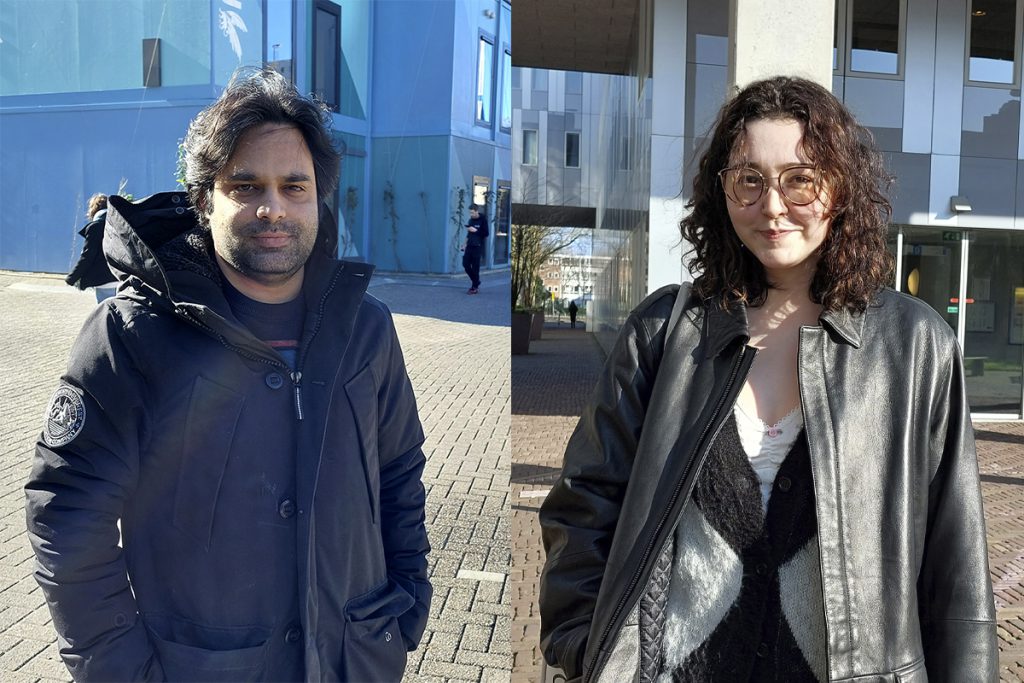“There is a sentiment that internationals don’t care because we don’t speak the language”, says Isabella Gerig (21), a VU Law in society student from the UK. She lived most of her teenage years in Spain and moved to the Netherlands three years ago. She understands why Dutch people might be upset with internationals who don’t learn the language, but she’d like for people to take a step back and look at the systemic reasons why many people haven’t managed to learn Dutch.
Secret Dutch courses
When she came to the Netherlands, Gerig made it her goal to learn the language. In part because she had a Dutch partner at the time. But she faced two major hurdles, the most obvious one being that everyone speaks English. “The Dutch people I’ve interacted with prefer it when I speak English, because we can’t have much of a conversation if my Dutch is very broken.” The longer she stayed, the more her motivation to learn Dutch decreased, but she hasn’t given up just yet.
The other issue is that Dutch courses are expensive. Gerig did take classes when she moved to a municipality that offered a free course, but at VU Amsterdam she couldn’t find anything affordable, nor could she when she studied at the University of Amsterdam. But that doesn’t mean those affordable courses don’t exist: “Sometimes there’s whispers in the corridors about cheap or free Dutch courses, but I can never find them online. It’s like there are these covert Dutch courses that I keep missing out on.”
Start right away
Ahmad Farhan (34) from Pakistan had a similar gripe. Back when he studied in Germany, he was offered an intensive German course during a semester break. However, he didn’t come across similar opportunities in the Netherlands. There are plenty of courses, but Farhan says there are less initiatives and policies to get internationals to take them.
The Biophysics of photosynthesis researcher of VU Amsterdam spent six years in the Netherlands and only started learning the language several months ago. Farhan thinks it’s better to start learning right after you arrive though: “If you put it off for a long time, it becomes more phobic.”
Can’t Dutch This
Farhan recently completed a beginners’ course for students and expats from Can’t Dutch This and is following it up with their more advanced course. The native Urdu speaker can now hold decent Dutch conversations, so long as his conversational partner is mindful of his limitations.
His advice to learn the language is to start with the basic sentence structure and grammar and to apply that to reading short stories. “Within a month, you can see a lot of improvement in your vocabulary and comprehension.” Farhan says taking a course can help if you lack self-discipline. And because he already spends a lot of time doing research, following a course with an energetic group is also just much more fun.
Stressed chickens
Gerig thinks an important part of learning a language is daring to make mistakes, which she is not always in the mood for. She estimates that she knows about twenty Dutch words and can just about order a coffee. “As soon as the conversation strays from the norm, I freak out.” Not understanding the language can be anxiety-inducing for Gerig, as she can’t help but wonder if people are “talking shit” about her when they speak Dutch. “It’s insane, because they probably haven’t even noticed me”, she says laughingly.
Among the twenty words Gerig knows, at least four of them are swear words. “It’s so funny that the Dutch use diseases as swear words. I have never seen that in any language, like tyfus, kanker [typhoid, cancer, Ed.]. Why is that a thing? I also find godverdomme [goddamnit, Ed.] and verdorie [shucks, Ed.] really funny.” Farhan is more partial to the expression kiplekker [tasty chicken; used to say you feel well. Ed.]. “I like using it because in other languages there are stressed chickens, but not happy ones.”
Precious keepsake
Both internationals do think it’s important to acquire the language. “I don’t want to be that asshole who goes to another country and doesn’t learn the language”, says Gerig. She understands that people who only do their bachelor’s here don’t commit to learning the entire language, but she does find it important for people who plan to stay longer. She is still hopeful she can manage to learn it, as she does expect to stay for several more years and may have more time for studying Dutch after graduating.
Farhan wholeheartedly recommends learning the language. He explains that if someone with a different background from his would speak Urdu to him, he would immediately feel closer to them. So speaking Dutch could help him connect with the local population as well.
Even though Farhan himself took six years to start learning Dutch, he highly recommends other students to at least try. “Even those who are here for just two or three years. It’s a treasure that they might miss out on, while you can learn a lot with little effort. It’s not just a language, it also tells you about a culture and it’s a precious keepsake that you will carry around with you.”
